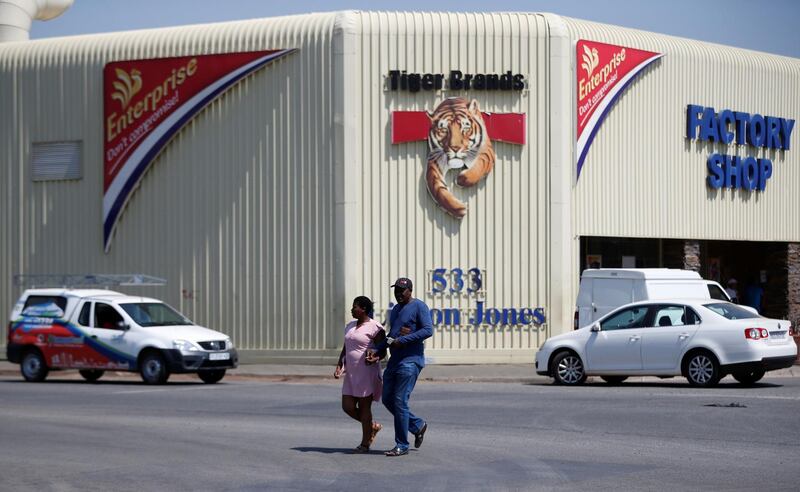South Africa is battling a deadly outbreak of food poisoning that was sourced to some of the country's most popular grocery items.
The bacteria-borne disease listeriosis has killed at least 180 people, which local scientists have traced to a cold meats factory owned by the country's largest food processor Tiger Brands. With a market value of around 80 billion rand (Dh25bn), Johannesburg-listed Tiger produces everything from canned goods to baby food, pasta and sausages.
At first, the company denied its plant was involved, but government scientists compared DNA samples taken from listeriosis victims to samples found at the plant.
"These are very dangerous circumstances for company," says Wayne McCurrie, Fund Manager at Ashburton Investments in Johannesburg, which owns Tiger Brands shares. "This must be handled with great care and with responsibility."
This past week the company finally conceded its products were involved and issued a recall.
"We are well advanced in the national recall of all ready-to-eat chilled processed meat products" said Lawrence MacDougall, CEO of Tiger Brands. "We will leave no stone unturned to get to the bottom of this to ensure it does not happen again."
The ground zero appears to be a range of popular meat snacks known locally as polony. It is cheap and heavily spiced, and often sold by street vendors. Polony, known as Bologna in the rest of the world, is often fried and eaten with bread, or simply eaten cold directly from the packaging.
It is especially consumed by labourers, in a form of street food known as 'kota' - a combination of polony, bread, fries and sauce. Street selling is an industry in itself. In 2016, a survey by a local financial publication Business Times found that informal sellers of fast food delicacies were collectively valued at about 10bn rand. This is now under threat unless the outbreak is quickly contained.
____________________
Read more:
[ UAE bans South African meat from two firms following listeria outbreak ]
____________________
Health Minister Aaron Motsoaledi has called on people to avoid street food until the outbreak is contained. “If you are used to eating kota and all that, just wait a bit. At least for now.” He urged people to be more aware of personal hygiene, to wash hands before cooking.
In the meantime, Tiger's troubles are just beginning. Lawyers are preparing a class action lawsuit on behalf of listeriosis victims. According to The National Institute for Communicable Diseases almost 1,000 cases have been detected so far, including the 180 or so who died from the disease.
"The foods they (Tiger Brands) produce are staples," attorney Richard Spoor, who is preparing the lawsuit, said through a statement on social media. "Processed meat is one of the cheapest forms of protein available to poor people and it is perfectly good to eat if the appropriate food safety measures are taken. The complaint is that Tiger Brands failed to ensure that the ready to eat food that they sold was safe to eat."
The South African processed meat market grew about 8 per cent in 2017 to a retail value of US$412 million, according to Reuters, quoting Euromonitor International figures. Tiger Brands has a 35.7 per cent local market share.
The lawsuit comes just as the company is shaking off the effects of a disastrous venture into Nigeria. In 2012 it acquired Dangote Flour, but by 2016 had exited what had been a sinkhole of money and was forced to write down 2.2bn rand in the process.
Apart from the lawsuit, many of its export markets such as the UAE have temporarily halted imports of South African-origin export meats. Of particular concern are the African countries that form the bulk of Tigers' export market, where the disease may as yet go undetected.
An emergency meeting of the 16-member Southern Africa Development Council (SADC) has been held, and several of South Africa's neighbours have already banned imports of at-risk items. However, porous borders and lack of capacity make detection of suspect items difficult.
So far, only Namibia has reported a case of the disease, which kills up to one in five people infected.
Lack of medical care for the sick in SADC states, and even of the technology to carry out the DNA sequencing needed to detect the strain of the disease was lacking in many countries. Mr Motsoaledi, the health minister, told local news website Times Live, following the SADC meeting: "It did arise in the meeting that countries might not be able to detect something like this."






